Grand Canyon Indigenous Learning Secrets Revealed: What Traditional School Trips Don't Want You to Know About Hands-On Cultural Education
- Caleb Mullenix
- Nov 19, 2025
- 5 min read
Most traditional school trips to the Grand Canyon follow the same predictable pattern: bus students to popular viewpoints, snap photos at Mather Point, and deliver geological facts through standard interpretive talks. While these approaches cover basic educational requirements, they miss the profound learning opportunities that Indigenous educational methods have cultivated for thousands of years at this sacred landscape.
Understanding authentic Indigenous learning approaches at the Grand Canyon reveals educational possibilities that transform students from passive observers into engaged learners who develop deep, lasting connections with both the natural world and cultural knowledge systems.
The Foundation of Indigenous Learning Philosophy
Indigenous education at the Grand Canyon operates on fundamentally different principles than conventional classroom-based learning. Traditional Diné and Paiute approaches emphasize multisensory engagement that extends far beyond visual observation. Students learn through sight, smell, taste, hearing, and touching: creating comprehensive understanding that engages emotional and physical responses to the environment.
This holistic approach connects knowledge to spiritual significance and cultural purpose. Rather than presenting information as abstract facts, Indigenous learning grounds every lesson in relationships between people, land, and community responsibilities. Students discover how geological formations, plant communities, and weather patterns connect to traditional ways of life, creating meaningful context that standard textbook lessons cannot provide.
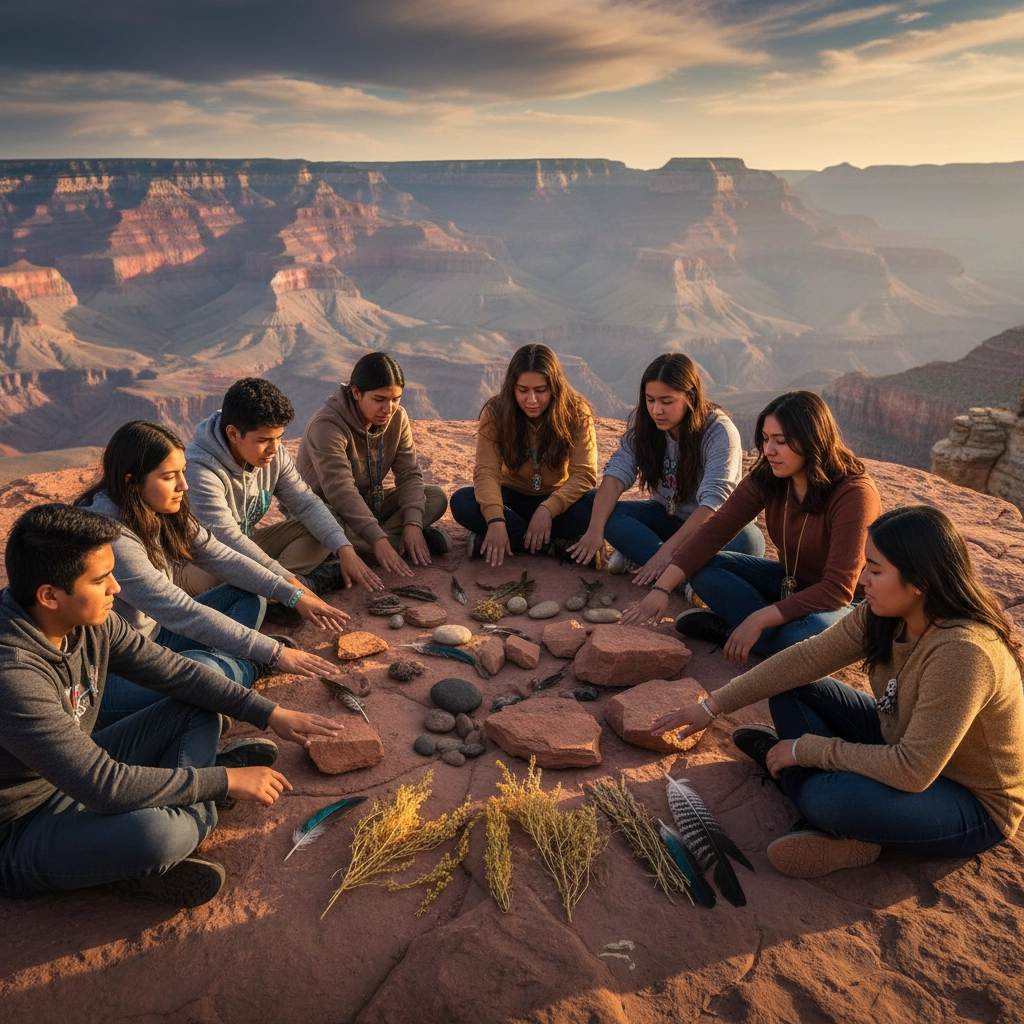
The University of Arizona, University of New Mexico, and Arizona State University recently received a $150,000 NSF grant to advance this approach through "Indigenizing" geoscience education. Their research demonstrates how integrating Indigenous knowledge systems with scientific concepts creates more comprehensive understanding while centering Native Nations' perspectives in educational experiences.
Direct Cultural Engagement Through Tribal Practitioners
Traditional school trips typically rely on non-Native interpreters to explain Indigenous cultures secondhand. Authentic Indigenous learning prioritizes first-voice interpretation, where tribal members share their own histories, traditions, and relationships to the landscape directly with students.
The Cultural Demonstration Program at Desert View, established in 2015, exemplifies this approach. Tribal artisans and community members from the eleven traditionally associated Grand Canyon tribes provide hands-on demonstrations of traditional crafts while sharing stories that reveal everyday life, beliefs, and cultural practices. Students observe basket weaving, pottery creation, and traditional tool-making while learning directly from practitioners who carry forward generational knowledge.
These interactions create opportunities for authentic cultural exchange that moves beyond superficial tourism. Students engage with living cultures rather than historical artifacts, developing understanding of contemporary Indigenous communities and their ongoing connections to the Grand Canyon landscape.
Place-Based Learning That Centers Indigenous Knowledge
Conventional geological education separates scientific concepts from cultural context. Indigenous learning approaches integrate traditional ecological knowledge with scientific observation, creating comprehensive understanding that honors both knowledge systems.
Recent initiatives focus on using the Grand Canyon's surrounding areas to teach scientific concepts while grounding learning in local communities' cultures, languages, and ways of knowing. Students learn about geological processes through traditional stories that explain canyon formation, understand plant ecology through traditional uses and management practices, and observe weather patterns through Indigenous seasonal knowledge systems.
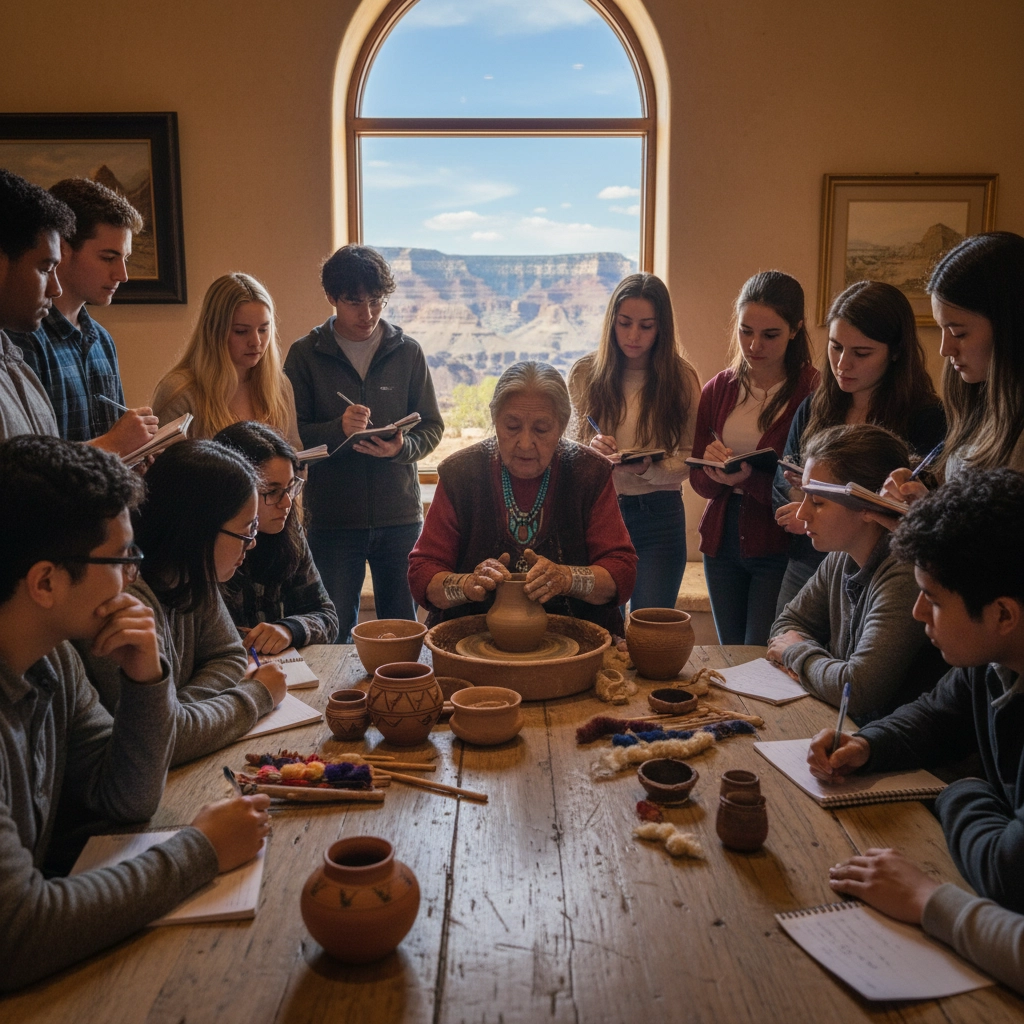
This integration requires respectful collaboration with Native Nations. Listening sessions with tribes including the Havasupai and Navajo Nation explore how to appropriately incorporate spiritual and cultural significance into educational programs while maintaining respect for sacred knowledge and protocols.
Intergenerational Knowledge Transfer Methods
Standard educational models typically position teachers as knowledge holders and students as passive recipients. Indigenous learning approaches emphasize reciprocal knowledge exchange between generations, where both youth and elders serve as educators and learners simultaneously.
Annual intertribal river expeditions through the Grand Canyon demonstrate this approach. Young Indigenous leaders and older knowledge holders raft the Colorado River together, sharing cultural teachings, traditional stories, and contemporary perspectives. These expeditions create space for natural knowledge transfer that occurs through shared experiences rather than formal instruction.
Students participating in similar intergenerational programs develop deeper appreciation for the continuity of Indigenous knowledge systems while understanding how traditional teachings apply to contemporary environmental challenges.
Addressing Historical Access and Equity Issues
Authentic Indigenous education acknowledges the complex history of Native peoples' relationships with the Grand Canyon. Traditional school trips rarely address how Indigenous communities were displaced from ancestral lands or forced to pay for access to culturally significant sites within the canyon.
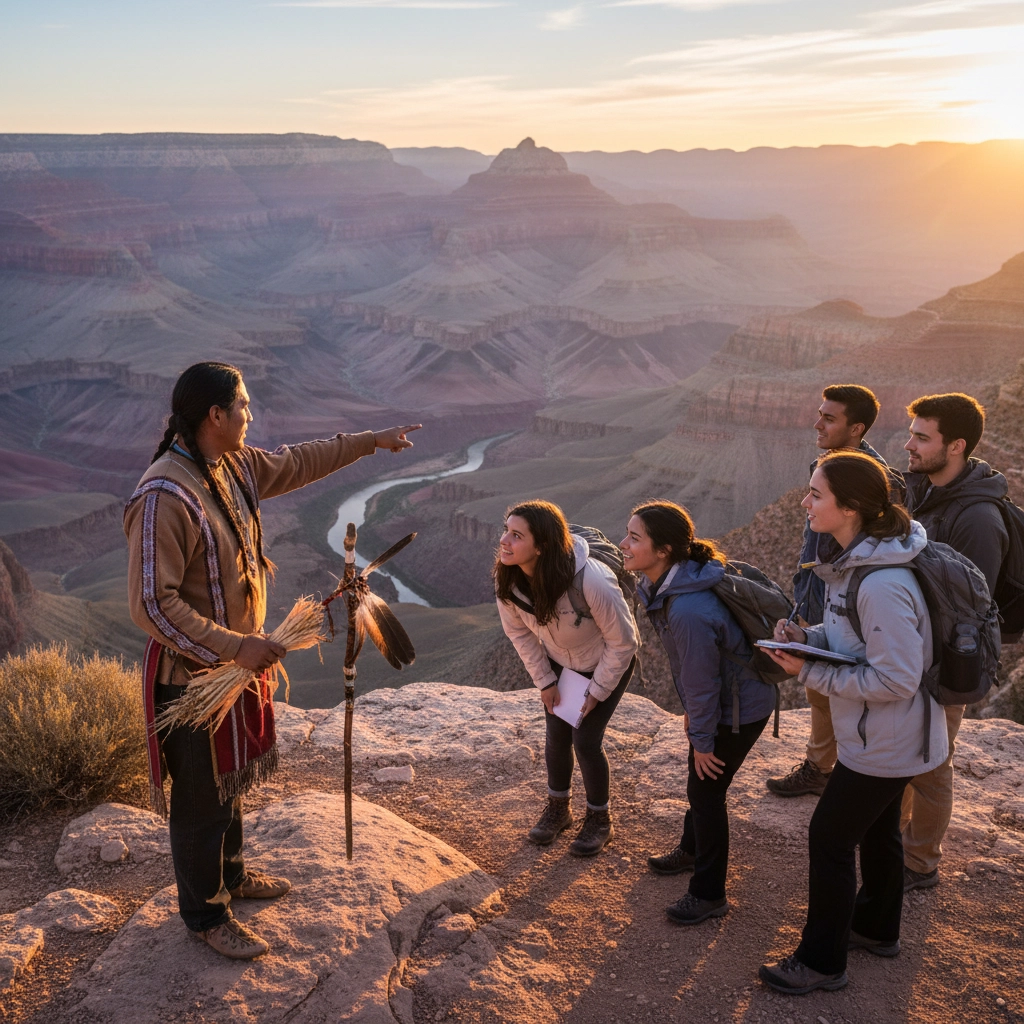
Educational programs that "Indigenize" learning experiences must acknowledge these historical inequities while creating opportunities for Native peoples to reclaim their educational roles at the Grand Canyon. This approach fosters mindful recognition of ongoing relationships between Indigenous communities and their ancestral landscapes.
The Grand Canyon Intertribal Working Group has prioritized establishing first-voice cultural interpretation across Grand Canyon National Park, ensuring Indigenous peoples control how their histories and cultures are presented to visitors. Their "We Are Grand Canyon" welcome video presents the canyon from Indigenous perspectives, while efforts to rename landmarks like Havasupai Gardens reflect actual cultural significance rather than imposed colonial designations.
How Appleseed Expeditions Incorporates Indigenous Learning Approaches
Recognizing the limitations of conventional school trips, Appleseed Expeditions designs educational experiences that honor Indigenous knowledge systems while providing authentic cultural learning opportunities for students and educators.
Our Grand Canyon programs prioritize direct engagement with tribal practitioners through partnerships with local Indigenous communities. Students participate in hands-on cultural demonstrations, learn traditional ecological knowledge through field experiences, and engage with contemporary Indigenous leaders who share perspectives on environmental stewardship and cultural preservation.
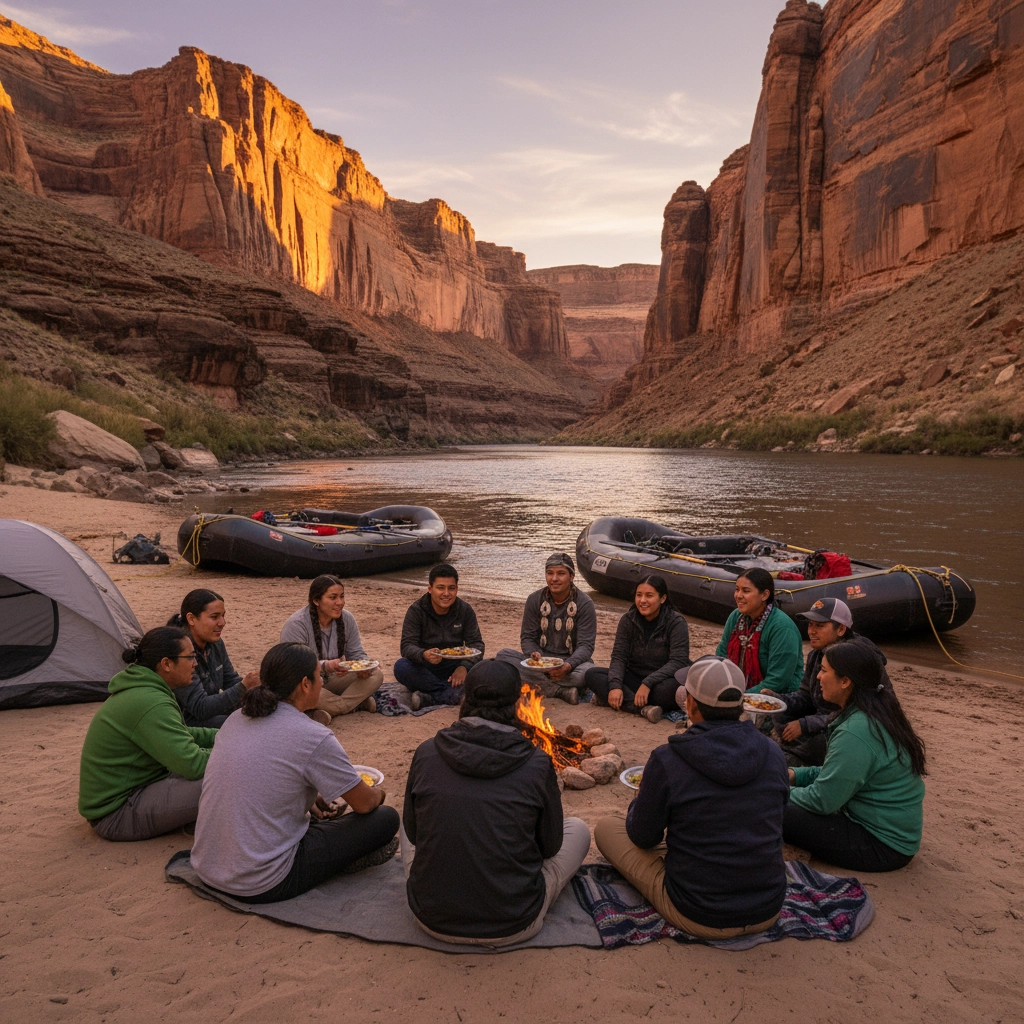
We structure learning experiences around multisensory engagement that connects students to the landscape through observation, touch, sound, and movement. Rather than limiting education to designated viewpoints, our programs explore diverse canyon environments where students can observe geological processes, identify traditional plant uses, and understand how Indigenous communities have sustainably managed these landscapes for millennia.
Our approach emphasizes place-based learning that integrates scientific concepts with traditional knowledge systems. Students learn about canyon geology through both Western scientific methods and traditional stories that explain landscape formation. They observe plant and animal communities while understanding traditional ecological relationships and management practices.
Creating Lasting Educational Impact
Indigenous learning approaches create educational experiences that extend far beyond single school trips. Students develop ongoing relationships with landscapes, communities, and knowledge systems that influence their understanding of environmental stewardship, cultural diversity, and their own roles in protecting natural and cultural resources.
These deep learning experiences prepare students to engage thoughtfully with Indigenous communities and environmental challenges throughout their lives. They develop appreciation for knowledge systems that offer alternative approaches to understanding natural processes and human relationships with landscapes.
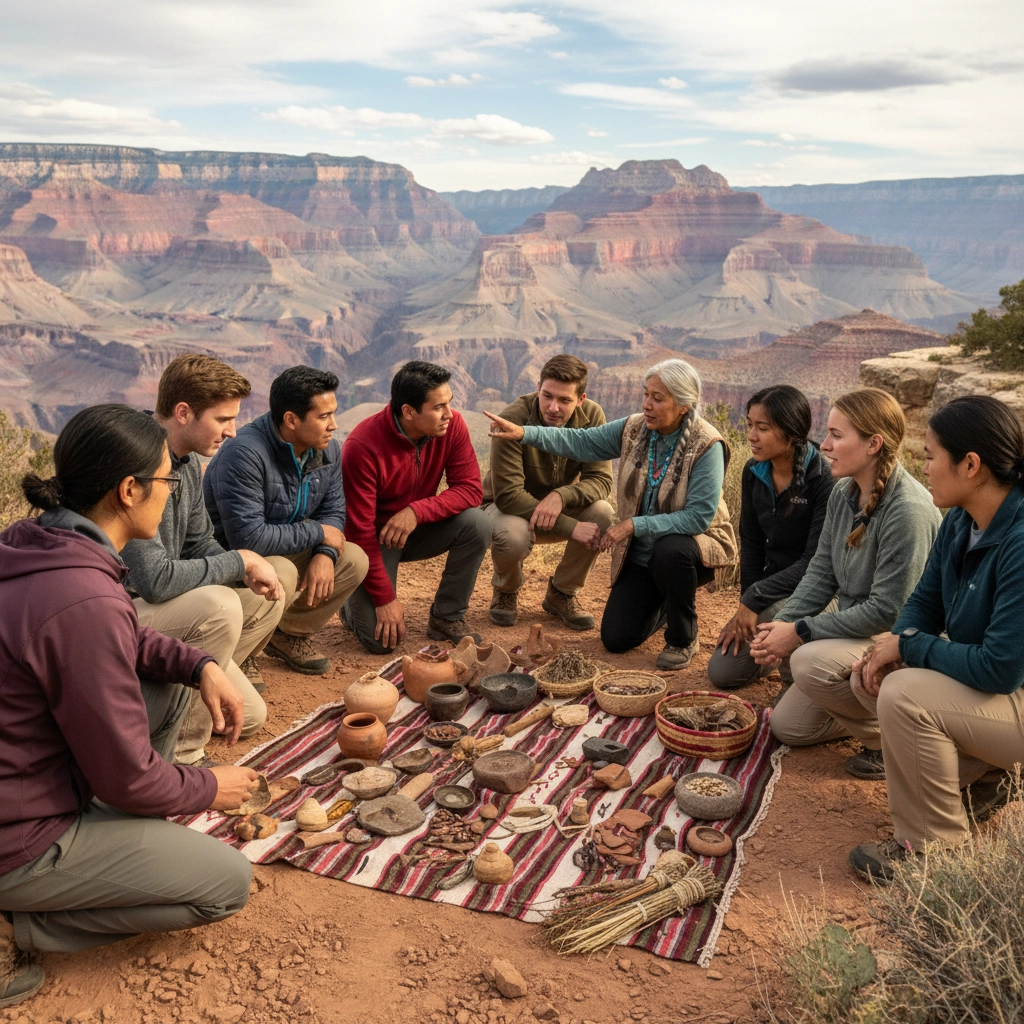
Traditional school trips provide introductory exposure to the Grand Canyon, but Indigenous learning approaches offer transformative educational experiences that honor the cultural significance of this sacred landscape while expanding students' capacity for cross-cultural understanding and environmental awareness.
Begin Planning Authentic Indigenous Learning Experiences
Ensure your students experience the Grand Canyon's profound educational opportunities by incorporating Indigenous learning approaches into your trip planning. Research tribal partnerships, prioritize first-voice interpretation, and design multisensory learning experiences that honor both scientific inquiry and traditional knowledge systems.
Contact Appleseed Expeditions to discuss how our Grand Canyon programs can provide your students with authentic Indigenous learning experiences that create lasting educational impact while respecting traditional knowledge and contemporary Indigenous communities.
Prepare your students for educational experiences that extend far beyond conventional tourism by embracing learning approaches that Indigenous peoples have refined through thousands of years of relationship with the Grand Canyon landscape.



Comments